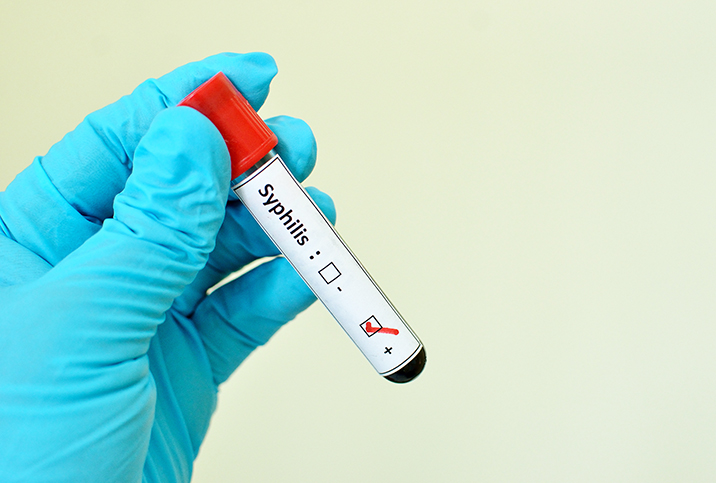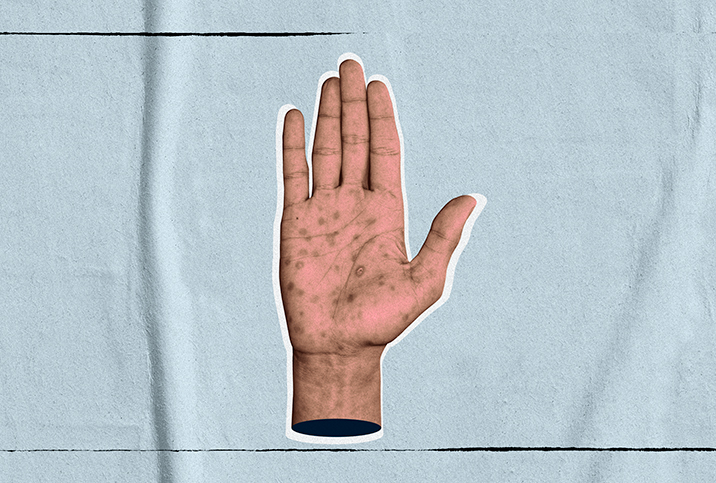Here Are the Keys to Living With Syphilis

Syphilis is a sexually transmitted disease (STD) that primarily spreads through sexual contact such as vaginal, anal or oral sex. The earlier the condition is diagnosed, the easier it is to treat, but the symptoms are sometimes difficult to notice. And given the stigma attached to syphilis and the myths and misconceptions about the disease, too many cases go ignored or unnoticed.
That can be a problem because untreated cases may return years or even decades after the initial infection, by which time it's a much more serious condition.
Incidents of syphilis are rising, especially among men who have sex with men (MSM), though anyone can get infected regardless of sexual orientation. An article published in the Lancet in August 2021 stated that the current rates of syphilis are "unacceptably high."
The four stages of syphilis
Once contracted, syphilis develops in four stages, explained Barbara Bawer, M.D., a family medicine physician and internal medicine expert at the Ohio State University Wexner Medical Center in Columbus, Ohio. The four stages are as follows:
- Primary stage. There will be one or more painless sores around the area of initial infection: anus, mouth, rectum, penis or vagina.
- Secondary stage. A red or brown rash will develop on the palms of your hands and the soles of your feet. The rash does not itch but is quite visible. Other symptoms include fatigue, fever, hair loss, headaches, swollen lymph nodes and a sore throat.
- Latent stage. This stage typically presents no symptoms and you will not be contagious. However, during this dormant period, which could last for years, the disease is in your bloodstream and can affect your bones, brain, heart and nerves.
- Tertiary stage. This is a severe stage where syphilis starts to affect and shut down organs, leading to heart problems, vascular issues, neurological damage, brain damage and death.
Syphilis is caused by a spiral-shaped bacteria known as Treponema pallidum. It is most infectious in its primary and secondary stages, according to the Centers for Disease Control and Prevention (CDC). There is a small possibility of contracting the disease during sex with someone in the latent stage of syphilis.
How to recognize the symptoms of syphilis
"Anyone who has intimate contact—typically oral, vaginal or anal—with a partner who is currently infected with an early stage of syphilis is at risk for contracting the disease," said Dana Dunne, M.D., M.H.S., an associate professor of medicine (infectious diseases) at the Yale School of Medicine in New Haven, Connecticut. "Their partner may not notice any symptoms themselves—or even have any symptoms to notice—so simply asking your partner if they 'feel like they have anything' would not be reassuring for possible exposure to any sexually transmitted infection or disease."
Even if your partner is asymptomatic or ignoring any symptoms because they're so slight, there are some signs you may notice if you come into contact with someone with syphilis.
"If you're exposed to a partner with infectious syphilis—patients are considered infectious during the first year of acquiring syphilis and especially when they have primary and secondary stages—you may notice a bump, or papule, at the site of infection, which evolves into a typically painless ulcer or chancre," Dunne said.
Chancres appear within three to four weeks after initial transmission and may not get noticed unless they appear in an obvious place such as the penis, lips or mouth. In many cases, a chancre that appears in the anus or vagina can go unnoticed until syphilis progresses to the secondary stage. The chancres themselves are known to be highly infectious and contagious, but treatment at this stage is generally inexpensive and effective.
Recommended
- The Gift of Health: STI Tests: Prioritize awareness and stop letting shame dictate your healthcare.
- Who Bears the Brunt of STI Stigma?: Having a sexually transmitted infection is bad, but what other people think can make it worse.
- What Are Men's Top Dating 'Icks?': Dating is difficult. What happens when your beau has an "ick" factor?
If treatment is not administered during the primary stage of syphilis when chancres first appear, the disease will progress to an even more infectious secondary stage. The chancre will heal independently in about six weeks whether you get treatment or not.
The secondary stage of syphilis is more obvious. A widespread maculopapular rash will present on the torso, palms and feet. This is also typically accompanied by a fever, swollen lymph nodes and other symptoms.
At this stage, syphilis has entered the bloodstream and may be the direct cause of a variety of symptoms that will differ from person to person. Similar to primary-stage syphilis, secondary-stage symptoms will resolve without treatment. Even though the symptoms seem to cure themselves, without treatment, the syphilis in the bloodstream will lie dormant and eventually usher in the latent stage of the disease.
Most people will realize they have something as soon as the rash appears in the second stage and get a diagnosis from their healthcare professional.
What is it like to live with syphilis?
"Living with syphilis is often not much different than without it, but it depends on each individual," Bawer said. "Most people, when first learning about their diagnosis, will experience anxiety symptoms such as worry, guilt and fear. This is common and normal as the news can be devastating.
"If you progress to the further stages, this may mean you will need to have more treatment and monitoring, and possibly treatment for other organ systems that are affected."
For a condition that is so serious in its later stage, syphilis can be treated easily and effectively if diagnosed in the primary or secondary stages.
"Syphilis is treatable, although identifying it promptly is critical to prevent any serious health problems," said Amanda Thornton, M.D., an infectious disease physician for Kaiser Permanente in Northern California. "Syphilis can be cured with antibiotics, and once treated, it will not progress further and will not spread to others.
"Treatment in the early stages will make the sores or rash go away. Treatment that is only started after more serious and longstanding infections cannot undo the damage done to organs—like your eyes."
Despite syphilis being easier to cure compared to other sexually transmitted diseases, incidence rates worldwide are rising, according to The New England Journal of Medicine. A story in the February 2020 issue suggested that the increasing levels of syphilis in the population are unprecedented and that they were the highest in the U.S. over the past 20 years.
Overall, syphilis is not as prevalent as STDs such as chlamydia and gonorrhea. However, no one knows why cases of syphilis are on the rise. Some researchers have pointed to the rise of online dating, which has made casual sex more accessible.
"Don't jump into sexual activity right away until you get to know the person you're dating. Once you get to a point where you do want to get intimate, be honest with your partner about your diagnosis and what it means for you and for them," Bawer said. "Wear condoms for protection and make sure you are following all of your doctor's recommendations on not just treatment but also the follow-up and testing required to confirm if you've been cured or if additional therapies are needed."
STDs, STIs and Senior Citizens: More than 40 percent of the 54 million people older than 65 in the U.S. remain sexually active. It's vital to educate older adults to ensure they're aware of sexually transmitted infections.
"It is not associated to this date with infertility, but it has significant reproductive implications if a person acquires syphilis while carrying a pregnancy," Dunne said. "This can lead to the unborn baby acquiring syphilis as well—called congenital syphilis—and, depending on when syphilis is acquired, can lead to the baby being stillborn."
Syphilis during pregnancy can cause yellowing or jaundice, swelling—an edema—and eye, ear, bone and teeth problems. Such potential outcomes are why it is the law in all states to test pregnant people for syphilis in the first trimester. In some states, there is a requirement to test in the last trimester.
"There has been a recent increase in congenital syphilis cases," Dunne said. "The most common reason is lack of prenatal care, as penicillin treatment is otherwise very effective in preventing congenital syphilis if given early enough."
Myths and misconceptions about syphilis
Myths about syphilis abound. Many of them are easy to dispel, which Alex Polyakov, M.B.B.S., a senior clinical lecturer at the University of Melbourne and clinical director at the Royal Women's Hospital in Australia, does.
Myth
Syphilis is no longer a problem in 2023.
Fact: Syphilis is still a common STD and is becoming an increasing public health concern in some areas.
Myth
Syphilis is easily cured with antibiotics.
Fact: Syphilis is treatable with antibiotics. Left untreated, however, it can cause serious, long-term health problems that are not so easily treated.
Myth
You can only get syphilis from someone who has a visible sore or chancre.
Fact: Many people who have syphilis do not have visible sores, and it is possible to transmit the infection to others even if you don't have any symptoms.
Myth
You can't get syphilis from oral or anal sex.
Fact: Syphilis can be transmitted through oral, vaginal and anal sex.
Myth
Only certain people are at risk for syphilis.
Fact: Anyone who is sexually active can get syphilis, regardless of their age, gender or sexual orientation.
"It's important to get tested if you have any concerns and seek medical attention," Polyakov said. "It's also important to practice safe sex and limit the number of your sexual partners to reduce the risk of getting syphilis."
Misinformation Makes STIs and STDs Worse: Sex and sexually transmitted infections (STIs) are surrounded by a centuries-long history of stigma that to this day negatively impacts our reproductive and overall health. Taking precautions is key, but that relies on you knowing the right facts first.
Prevention and aftercare for syphilis
Treatment for primary, secondary stage and early latent-stage syphilis all require penicillin G benzathine administered intramuscularly. Late latent-stage syphilis and tertiary syphilis can also be cured with penicillin but will need a higher dose administered over a longer period.
If you or a potential sexual partner has syphilis, abstain from any sexual contact until the penicillin injection has been administered and given time to clear the infection. Wait until your doctor confirms that treatment is successful before having sex again. Typically, penicillin is fast-acting and highly effective, but your doctor may recommend you not have sex for at least two weeks after treatment, most likely insisting you have a test at that time to show the medication has worked.
If you're a man who has sex with men, you are at the highest risk of catching syphilis. About 86 percent of new cases in 2018 came from men, according to The New England Journal of Medicine, and more than half reported having sex with other men. Experts recommend sexually active gay men undergo regular screening and blood tests, especially as syphilis is linked to a higher risk of contracting the human immunodeficiency virus (HIV).
"The only way to truly prevent syphilis is to not participate in genital, oral or anal sex," Bawer said. "However, condoms can lower your risk. You should also request that any potential sexual partner get tested for genital, oral and anal syphilis before participating in a sexual relationship with them to know they do not have this disease."


















